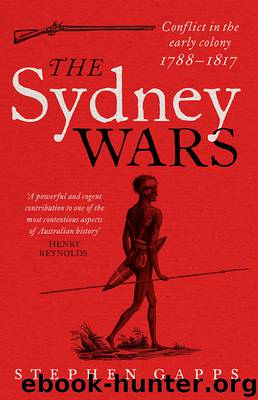The Sydney Wars by Stephen Gapps

Author:Stephen Gapps
Language: eng
Format: epub
Publisher: NewSouth
6
KILL ALL THE WHITES BEFORE THEM
1814–March 1816
A spirit of hostility
When Lachlan Macquarie arrived in the colony, in late 1809, he instigated important shifts not only in the construction of public buildings and proper finances – for which he became well known – but also in military matters. With a number of volunteers from the New South Wales Corps (by that time reassigned as the 102nd Regiment), Macquarie’s 73rd Regiment, which arrived in the colony with him to replace the corps, was just 19 men shy of 1000 rank-and-file soldiers. Alongside this were some of the ‘old soldiers’ of the corps who were formed into an Invalid or Veterans Company of 100 rank and file.
Macquarie initially had no need to consider using the military against Aboriginal people. In November 1812 George Suttor wrote to his patron Joseph Banks that since his arrival in the colony, Macquarie, unlike all the other governors, had not ‘been troubled with a native war’. But this changed in 1814. The summers of 1812 and 1813 were dry, and by early 1814 the Sydney region was in a period of drought. As Macquarie himself described it in mid-January, ‘All vegetation is again at a stand, the ponds and streams again exhausted, and the cattle once more sickening and dying from actual want of food and water’.
Historians suggest that periods of drought in New South Wales may have led to conflict from 1814 to 1816. John Connor’s study of the period from 1824 to 1841 in inland southeastern Australia found a ‘strong correlation between the outbreak of armed conflict … and droughts resulting from the effect of significant external climatic drivers’. However, it remains unclear if this was the case in the south and west of Sydney from 1814 to 1816. Raids on farms may have begun there in earnest in 1814 because traditional food supplies were scarce in the drought conditions or simply because the increasing numbers of isolated settlers in the more rugged country south of the Nepean provided relatively easy targets. Or both may be true. Nevertheless, in May the Sydney Gazette and New South Wales Advertiser found it was a ‘painful necessity’ to report ‘violences between the natives and our selves, which from the tranquillity and good understanding that for the last 5 or 6 years’ had prevailed it had hoped ‘were not again likely to occur’.
In February the farm belonging to William Cox’s son George, at Mulgoa, on the Nepean River, had been ‘attacked several times’ by ‘mountain natives’. The Gazette said his workers had been ‘compelled to defend themselves with their muskets, which the assailants seemed less in dread of than could possibly have been expected’. Then, to the south, John Thomas Campbell’s servants came under attack at his property Shancomore, near Wallacia, by ‘nearly 400’ people. His overseer William Reardon ‘was speared through the shoulder’, and ‘several pigs were killed, one of which, a very large one, was taken away’. The raiders also took a ‘quantity of corn, and other provisions; the overseer’s wearing apparel, and cooking utensils’.
Download
This site does not store any files on its server. We only index and link to content provided by other sites. Please contact the content providers to delete copyright contents if any and email us, we'll remove relevant links or contents immediately.
| Africa | Americas |
| Arctic & Antarctica | Asia |
| Australia & Oceania | Europe |
| Middle East | Russia |
| United States | World |
| Ancient Civilizations | Military |
| Historical Study & Educational Resources |
The Memory Code by Lynne Kelly(2401)
Schindler's Ark by Thomas Keneally(1886)
Kings Cross by Louis Nowra(1797)
Burke and Wills: The triumph and tragedy of Australia's most famous explorers by Peter Fitzsimons(1427)
The Falklands War by Martin Middlebrook(1386)
1914 by Paul Ham(1345)
Code Breakers by Craig Collie(1253)
A Farewell to Ice: A Report from the Arctic by Peter Wadhams(1248)
Paradise in Chains by Diana Preston(1247)
Burke and Wills by Peter FitzSimons(1238)
Watkin Tench's 1788 by Flannery Tim; Tench Watkin;(1232)
The Secret Cold War by John Blaxland(1213)
The Protest Years by John Blaxland(1206)
THE LUMINARIES by Eleanor Catton(1196)
30 Days in Sydney by Peter Carey(1160)
Lucky 666 by Bob Drury & Tom Clavin(1155)
The Lucky Country by Donald Horne(1140)
The Land Before Avocado by Richard Glover(1119)
Not Just Black and White by Lesley Williams(1087)
